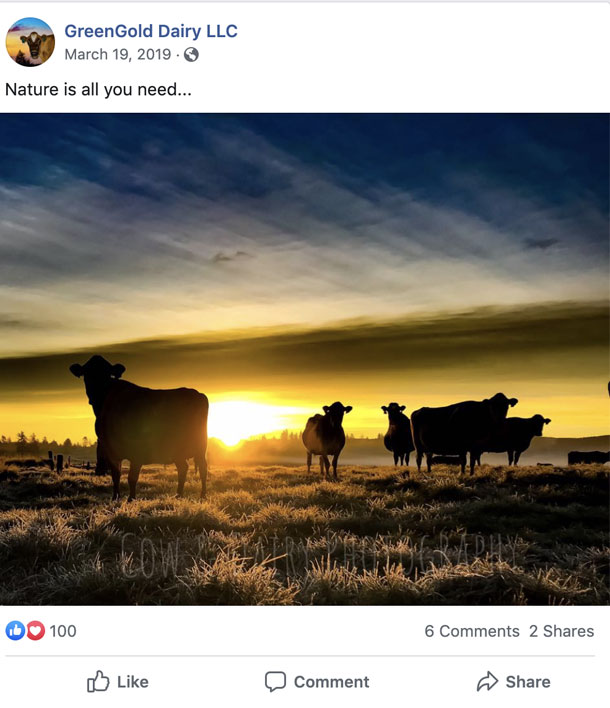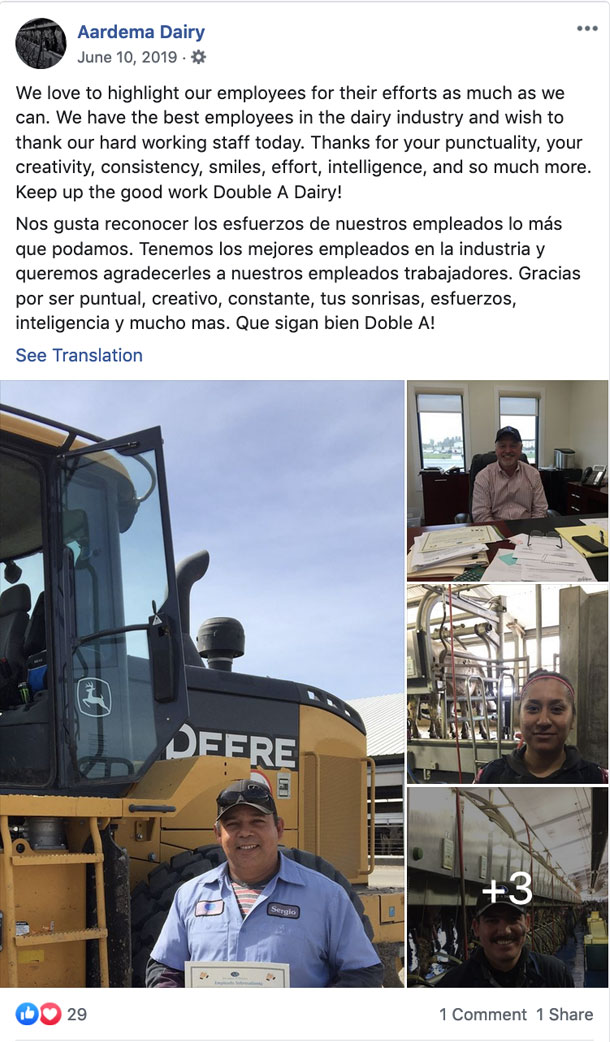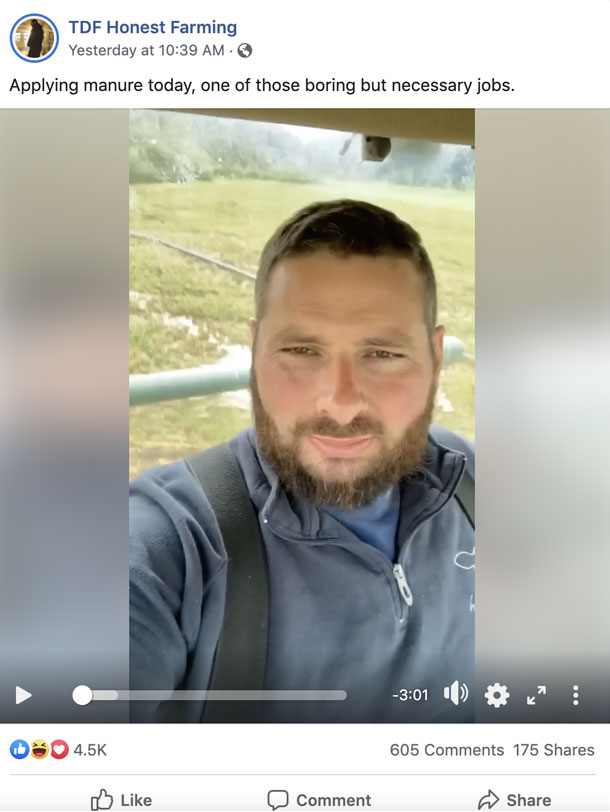It is important to stand out from the crowd but still get your point across. It is important to determine the who, what, when, where, why and how of your page and share what is most natural for you and your farm.
What follows are a few examples of dairy farmers who have found their just-right niche on social media.
A relatable – and often funny – look at dairy farming
Erin Grawe and Megan Daluge are fifth-generation farmers who milk 140 cows, alongside their father in Janesville, Wisconsin. Looking to educate consumers, especially those in the millennial age group, Erin and Megan revamped their existing Facebook page, Daluge Farm Inc.
“About two years ago, when the milk market was not good, we started to brainstorm how we could diversify and make an impact without breaking the budget. We started on-farm agritourism and made more educational posts on social media,” Daluge says.
Recently, the duo have been posting more light-hearted, funny posts that appeal to both farmers and consumers. The sisters posted a comical video titled “Daily struggles of a dairy farmer” that received more than 82,000 views.
“Erin is more quiet but really witty, and I am more comfortable in front of the camera. We brainstorm and just feed off of each other, so we came up with the dairy farmer struggles and posted it on National Ag Day,” Daluge says. “We just filmed a parody video that we hope will reach a lot of people and make a large impact.”
Continuing to explain how they have incorporated funny content, Grawe adds, “Millennials and Generation Z are really interested in the TikTok app. So, I made a TikTok account, and we posted a video about spreading manure. It was funny, and we got a lot of random followers that we probably wouldn’t have normally gotten.”
“Our goal is to continue to grow the Facebook page and our Instagram page, reach more people, and continue to make an impact. We have done pictures and long posts, but we are finding that people want to see us working or in-front of the camera with videos, so we will go that direction,” Daluge says.
Grawe offered her advice to other dairy farmers who are interested in starting a page: “I feel that there are so few farms now that if every farm had some form of social media, they'd always reach someone new,” she says. “People like to see the farmer doing the job and being real and raw. A live Facebook video can be intimidating, but people like that we are being real and not sugar-coating anything. Keep it classy; don’t bash other farmers or use the wrong verbiage. As farmers, we want to be united.”

Sharing her view of the farm
Marika Cowan of GreenGold Dairy LLC in Nehalem, Oregon, shares her view of farm life through beautiful photos. “I started the page because many people in our community didn’t even realize we had a farm there. I wanted to start some community involvement and education, share the status of our cows and show how they are cared for,” Cowan says. “I have a personal Facebook page, but it is set to private, and people wanted to see the pictures that I was posting of the cows. By starting a public business page, I was able to share those images with both farmers and consumers that I wasn’t friends with.”
Cowan had a knack for photography, which led her to post pictures rather than text-heavy posts. “Most of the pictures I take are just spur-of-the-moment images, and I take many different shots before I get the one I am going to post. I like to let the pictures speak for themselves and show real-life on our dairy,” she says. “We have posted a few videos that also went viral, even without ever paying for outreach.”
“I try to post every couple of days or so. I don’t schedule posts, I really just post pictures as I take them,” Cowan says. “When I do take a lot of pictures at once, I can use one that I didn’t post right away at a different time.”
“If other farmers want to start a Facebook page, the advice I have is to always tell the truth. Even if your pictures aren’t professionally taken or edited, it is important to post those images, because you want to show your followers genuine images,” she says. “Don’t start a page if you aren’t going to enjoy it or because you feel obligated. Do it because you enjoy it and want to share the truth about your dairy farm.”

Recognizing hard-working employees
Collin Robertson works as the human resources manager at Double A Dairy near Jerome, Idaho, and runs their Facebook page, Aardema Dairy. The Aardema Dairy page focuses on employee outreach and personnel recognition. Robertson says, “I started the page as a way to find employees. We had employees that would share my contact information if we needed to hire, and then I would have calls coming in from many different sources. With this page, I am able to monitor the postings and narrow the candidate pools myself.”
When he started as human resources manager, Robertson’s goal was to retain employees. “I looked at how we could add value for our employees and give them something to take home and certify their hard work,” Robertson says. “I would reach out to other managers and ask for a name and short biography about an employee that we would highlight on our page. We’d give that employee a certificate and a gift and post their picture.”
“If you highlight employees, be fair and spread out who you are highlighting. Yes, you would love to highlight everyone, but featuring one at a time is great too. When you feature employees, be specific. Speak about things the employee excels at, rather than just ‘they do great work,’” Robertson says.
When it comes to facing challenges, Robertson says, “There are always negatives. No one can stop the people sitting at home being negative, so upkeep is a lot of work. However, I try not to engage with those negative people. When people write negative comments, I send them a message and ask if they have any questions on the jobs we have available.”

Sharing the truth about dairy
Derrick Josi of Tillamook, Oregon, aims to educate consumers and those who have lost touch with dairy farming on his page, TDF Honest Farming. Josi says, “I was posting a lot of information about dairy on my personal page, and one day it just dawned on me to start a business page. I wanted to combat misinformation and show that farmers are no different than the general population. We have families. We care about the environment. We are normal people.”
Josi posts videos of real life on the farm, along with links to more information about the given topic, but it was not always that way. “I started out trying to be anonymous and would write long, typed out posts with lots of links and pictures. I have now morphed to doing the videos,” Josi says. “I didn’t put a lot of thought into how I was going to do the page; it was just natural. I was posed with the question of whether my audience would be farmers or the general population, and when I chose the general population, it all fell into place.”
“Don’t be afraid to reach out to farmers that already have successful pages,” he continues. “I try to make a point to give advice to other farmers if they ask for it when it comes to creating their pages. I had some people that helped me and some who didn’t, and I want to be someone who helps other people. Set time limits, and learn to walk away. You need to decide if you are going to immediately ban activists or not, but if you don’t, remember it is OK to walk away. If a conversation with a negative person is going nowhere, leave the conversation after two replies. You can’t spend too much time on just one person.”
Josi shared a few key takeaways that he feels are valuable, saying, “I’ve learned that if all you ever do is act professional without being a human, you won’t get anywhere with your page. People respond more to a personal story and someone they can relate to [rather] than someone who is just spewing facts. You don’t need to get every single detail right; other farmers will look out for you.” PD
Rachel Coyne is a freelance writer and a student at the University of Minnesota – Twin Cities.
PHOTOS: Screen captures were taken from individual Facebook pages.



